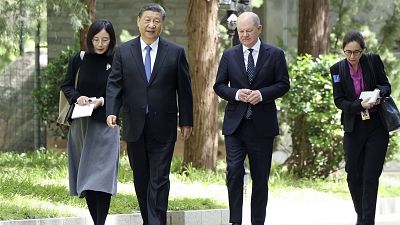The country also has to deal with a massive and costly influx of refugees from Syria & Iraq, for which it feels it does not get enough recognition or support.
Jordanian unions are going ahead with a strike to protest against a draft tax law despite efforts by King Abdullah to defuse public anger.
The country has seen its largest protests in years over the new tax laws, on the back of rises in the general sales tax and the ending of bread subsidies earlier this year.
Shopkeepers worry they won't be able to replenish their shelves once their current stock is gone.
The government's price rises mean that costs have mushroomed for small businesses.
"The government and its failed policies, keep raising prices without real studies, All they care about is bringing down debt or the budget. How long will the citizens be able to put up with this? I have owned this shop for 10 years. In a couple of months I'll be sitting at home," says grocer Eyad Mkheimar.
IMF to the rescue?
The government's plans to raise taxes are part of reforms driven by the International Monetary Fund aiming at lowering the $37 billion debt.
Here are a few measures under the proposed Tax reform:
More does not mean better -
- Reforms could double the tax base, from 5 to 10 percent of the population.
- Taxable income will begin at lower levels, and other tax exemptions will be scrapped.
Many protesters are young, and even the qualified ones complain of struggling to pay their bills, find jobs, or build a future in Jordan's sluggish economy.
Getting lost in the 21st century slipstream -
GDP Growth: At 2% for 2017, it is barely enough to keep pace with the rising population.
Unemployment: This hit 18.4% in the first quarter, while inflation was at 4.6% in April.
Jordan and the IMF have a three-year plan in action. The government argues the reforms will reduce social disparities by placing a heavier burden on high earners.
The country last saw domestic unrest in 2012, when the IMF told the government to lift gasoline prices.



